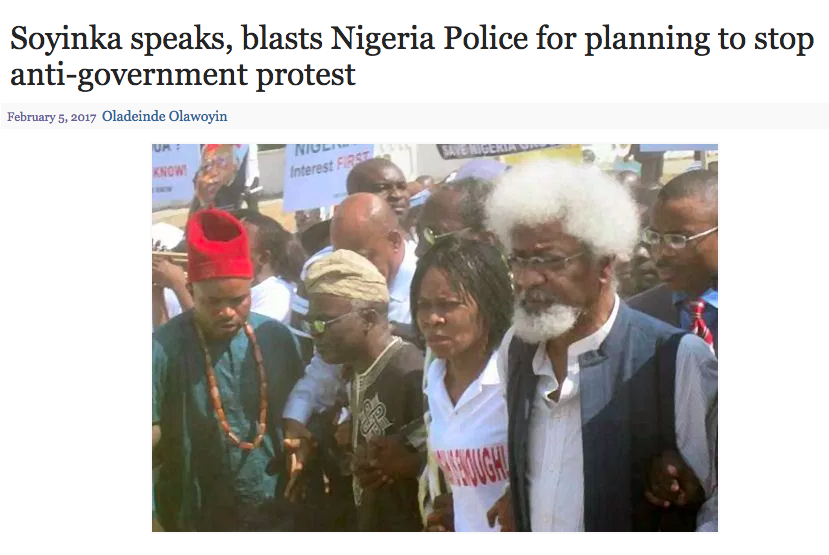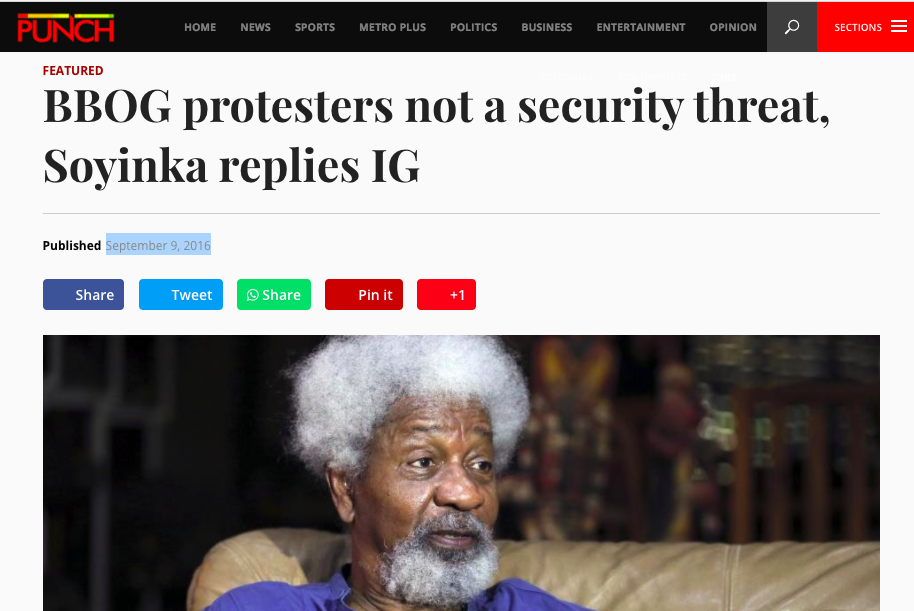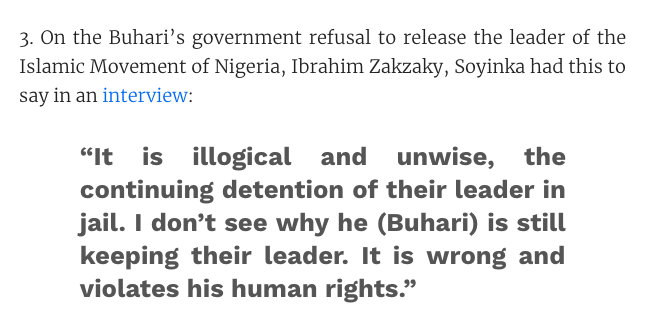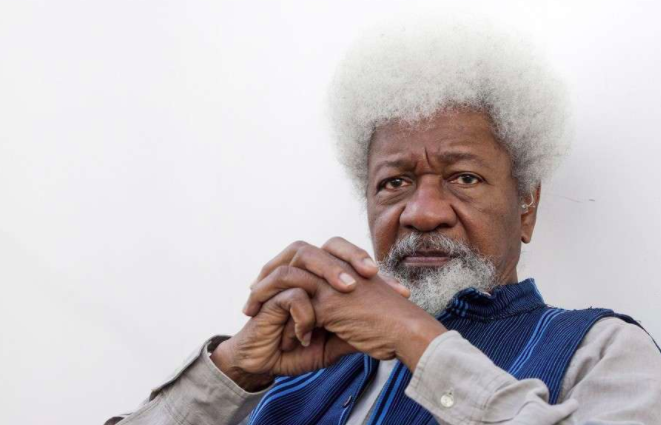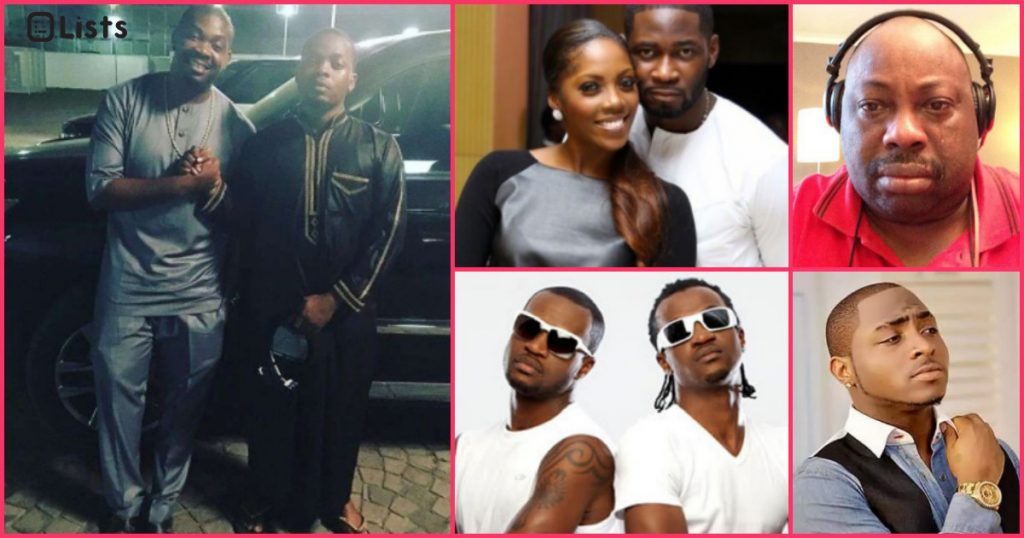Wole Soyinka (full name Akinwande Oluwole Babatunde Soyinka) is a Writer, Playwright, Poet, Professor, and Africa’s first Nobel Prize in Literature winner. Also called Kongi by friends and admirers, the 83 year-old octogenarian has lived most of his life being an activist, and for the purpose of this Listicle, we will be focusing on his activism, and all the times he fought for Nigeria and its people.
Enjoy, appreciate this National Treasure, and share.
-
Hijacking a Radio Station
In 1965, after the Regional Elections in Western Nigeria, Samuel Akintola was declared winner. Most people felt that the UPGA (led by Obafemi Awolowo, who was in prison at that time) was supposed to win, and the election was heavily rigged to favor Samuel who was the preferred candidate of the Central Government. As a result there was widespread tension and some violence. Then on the evening Akintola was supposed to broadcast his victory speech, someone got past the security at the Western Nigeria Broadcasting Service studio, held the crew hostage, seized Akintola’s speech and forced them to play his own tape – where he berated Akintola, called the election a sham and demanded fresh elections. Two days later, Wole Soyinka was accused of being the hijacker and declared wanted. He reported himself to the Police Station and was detained for two months, till a Judge acquitted him for lack of evidence.
-
Biafra
After the July 1966 retaliatory coup that ousted Aguiyi Ironsi and installed Yakubu Gowon as Head of State, a massacre against Igbo people living in Northern Nigeria ensued. This led to millions of Easterners fleeing south, and calling for secession. Hoping to avoid further bloodshed, Wole Soyinka secretly met with General Ojukwu and urged a peaceful resolution. But Ojukwu declared an independent Republic of Biafra, and Soyinka was accused of collaborating with the Biafrans. He went into hiding, but was captured by Nigerian troops, and imprisoned for the rest of the war.
-
Road Safety
To reduce the outrageous rate of accidents on highways, Wole Soyinka led a campaign for road safety in Oyo State. This initiative was very successful and became a model of traffic safety for other states in Nigeria.
-
Shehu Shagari
Wole Soyinka and a lot of other people agreed that President Shehu Shagari’s government was corrupt, and he led his criticisms. Shehu Shagari was then removed in a coup that installed Gen Muhammadu Buhari.
-
Buhari banned his book
While Soyinka was in prison during the Civil War, he was denied access to writing materials but somehow had them smuggled in. He wrote a lot in that time, including his prison memoirs, The Man Died. When Buhari came into power, the book was banned after his anti-government rhetoric became unbearable.
-
Abacha sentenced him to death
In October 1994, the United Nations Educational, Scientific and Cultural Organization (UNESCO) named Wole Soyinka a Goodwill Ambassador for the promotion of African Culture, Human Rights and Freedom of Expression. The next month, General Sani Abacha suspended all civil liberties, and people like Wole Soyinka who were vocally against the Military were targets. Fearing for his safety, Soyinka escaped from Nigeria on a motorcycle via the ‘NADECO Route’ – through Benin Republic. Abacha later sentenced him to death in absentia for the continued criticism of his government. Luckily, the general died in 1998, and Soyinka returned home.
-
2007 elections
In April 2007, when Olusegun Obasanjo’s tenure was coming to an end, Wole Soyinka called for the cancellation of the presidential elections that were held two weeks earlier. This is because it was beset with widespread fraud and violence. The election stood though, and the late Umaru Musa Yar’Adua was sworn in and remained president, till …
-
Protest to install GEJ
After Yar’Adua became very ill, and was away from Nigeria for about 50 days, Prof. Wole Soyinka and prominent members of civil society groups took their protest to the National Assembly, and demanded an immediate commencement of the process of impeaching the president. This was so that then Vice President Goodluck Jonathan could ascend to the presidency, and the country could move forward, as all the while the sick president was away, GEJ did not have full political power to lead Nigeria. One month later, a motion from the Nigerian Senate invested Goodluck Jonathan as Acting President of Nigeria.
-
Occupy Nigeria
“A serious government would have emplaced the ‘palliatives’ first, worked assiduously to ensure that they were effectively enforced, with, at the very least, a guaranteed stabilisation of the existing level of Nigerian subsistence – which was nothing to crow about in any case. Nothing remotely approaching this protective measure has taken place, only – business as usual.”
These were the words of Wole Soyinka, when he and other prominent Nigerians led thousands of protesters against the Fuel Subsidy removal by the Goodluck Jonathan government in 2012. They urged the president to rescind his decision to withdraw fuel subsidy, saying he should revert to the N65 pump price as it was anti-people. In the end, subsidy stayed, but pump price was increased to N97 per liter.
-
From Chibok with love
Wole Soyinka was heavily critical of the PDP led administration under President Goodluck Ebele Jonathan, labelling it corrupt and naïve. In August 2014, Soyinka delivered a recording of his speech ‘From Chibok with Love’ to the World Humanist Congress in Oxford, bemoaning the plight of Chibok and the failure of government to secure the Northern Nigeria. While the current government has been poor, one cannot deny the fact that they have returned relative peace to the once war-torn Northern Nigeria.
In summary
This listicle is inspired by the people calling Wole Soyinka a hypocrite for not being as critical of the current government as he was of past governments. While I can understand where there are coming from, I still think it is ridiculous to expect an 83 year old man who has spent the better part of his life fighting for this country, and is now battling prostate cancer to continue being at the forefront of the struggle for a better Nigeria. Young people keep saying they want to lead, but they want an old man to champion their struggle, and it is unfortunate. The man has been there, done that and if he decides to never speak about Nigeria, a country he has bled for, he reserves that right completely. Put some respect on his name.
And oh, just so you know, he has not been completely quiet about the affairs of the nation. See news cuts. You’re welcome.


